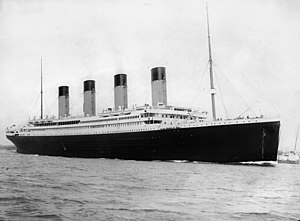 Two
hours after a crew member uttered that statement of arrogance, the Titanic
became a ghost, haunting the frigid waters of the North Atlantic.
Two
hours after a crew member uttered that statement of arrogance, the Titanic
became a ghost, haunting the frigid waters of the North Atlantic.
One
hundred and one years ago today, RMS Titanic struck an iceberg 400 miles off
the coast of Newfoundland and sank two hours and forty minutes later.
I've
been fascinated by this story and all of its chapters for decades. Have
read dozens of books on the sinking, the first and best of which is “A Night to
Remember,” by Walter Lord. I’ve seen a number of movie adaptations my
favorite, under the philosophy of never obtaining history from movies, being
James Cameron’s Titanic.
Which
begs the question, why? Why does the sinking of a ship hold imaginations
hostage a century later?
The
answer I think comes down to the one word most associated with this worst
maritime disaster ever: hubris. Extreme pride or arrogance.
Overestimating ones skills or competence, particularly among the powerful.
Countless
stories have emerged from the wreckage, many true, many maritime legends, but
all branch out from the ship like tentacles, even from more than two miles
under the Atlantic.
Here
are two of my favorites.
A
tragically romantic story surrounds Ida and Isidor Straus. Isidor was one
of the owners of R. H. Macy and Company. He urged his wife to get in the
boat, but she refused, saying “We have lived together many years. Where
you go, I go.” They sent Mrs. Straus’s maid instead.
Both
Mr. and Mrs. Straus were swept into the ocean.
Captain
Edward J. Smith ignored ice warnings which contributed to the sinking. He
paid with his life by going down with the ship. The architect Thomas
Andrews also paid, though he did nothing wrong, except design a sinkable
ship. Many of the officers died, too. But what about the Chairman
of the White Star Line, the man urging the Captain on to higher speeds, the man
who pressured the Captain to keep steaming ahead even after Titanic hit the
iceberg. That action probably caused the ship to sink faster.
J.
Bruce Ismay.
He
slipped into a lifeboat and saved his own skin despite the more than 1,500
people who died, including children. Though known after that as the
“Coward of the Titanic,” he did live another twenty-five years.
Ah,
there are so many more, and I’ll get to them at some point, I’m sure. But
what find most compelling is to hear the stories from the survivors
themselves. Check out the following link. It may lead you to
others.
And
tonight I'll think for a bit of those who became ghosts at the hand of hubris.

The story of the Titanic has always fascinated me and I especially love the documentaries where they show you her watery grave in detail.
ReplyDelete